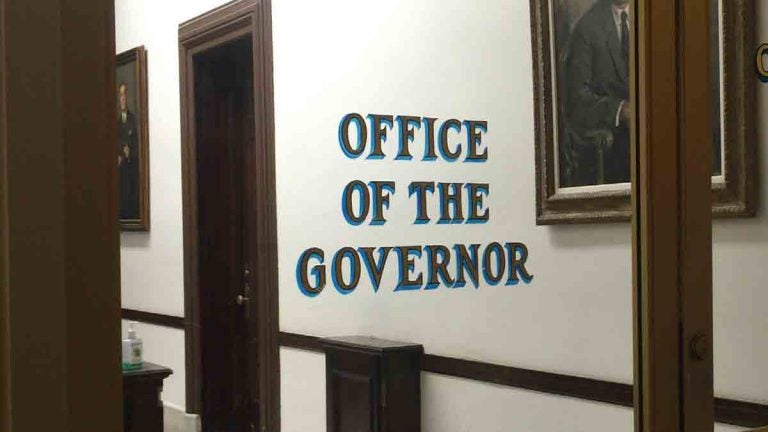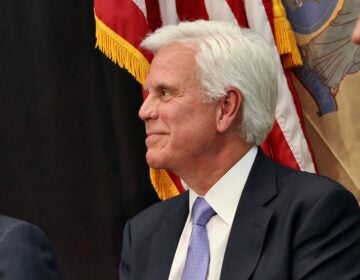How the 2017 N.J. Democratic gubernatorial nomination looks right now

Governor Christie is serving his second and final term. (Alan Tu/WHYY)
If it all plays out as anticipated, the campaign for the Democratic nomination for governor next year will pit good old-fashioned machine politics against a grassroots anti-establishment insurgency.
The smart money is on the machine.
By securing the endorsement of the state chairman, the unanimous support of county chairs and a slew of party leaders, former U.S. ambassador to Germany and Goldman Sachs executive Phil Murphy became the quintessential establishment candidate.
Confronted by this display of organizational strength and financial prowess, state Senate President Steve Sweeney (D-Gloucester) and Sen. Ray Lesniak (D-Union) were quickly convinced further resistance was futile and abandoned plans to seek the nomination. Jersey City Mayor Steve Fulop, a potential contender, saved face by announcing just prior to Murphy’s lightning strike of county organizations that he would not enter the primary, thus avoiding the embarrassment of being chased out of the race.
Sensing an opportunity, Middlesex County Assemblyman John Wisniewski opted to gamble that the wave of anti-establishment fervor that Vermont Sen. Bernie Sanders rode to the brink of the presidential nomination had lost none of its power and that he could tap into it successfully.
Wisniewski served as the Sanders campaign coordinator in New Jersey — a decision that angered the party sachems who denied him a national convention delegate spot — but is best known for his leadership of the special legislative committee to investigate the Christie administration’s involvement in the George Washington Bridge lane-closing scandal.
Whether the Sanders flame that very nearly torched Hillary Clinton continues to burn with the same intensity in New Jersey is problematic.
The more likely explanation for the success of the 74-year old socialist is that it was a matter of the man and the moment coming together at precisely the right time in history, sparking a movement that captured the imaginations, hearts, and votes of millions of Americans disillusioned with politics and government as usual and seeking a dramatic way to vent their anger and frustration.
Sanders caught lightning in a bottle. Wisniewski faces the far more difficult challenge of capturing yesterday.
Primaries are party elections, controlled by organizations that bestow their favor on a pre-selected candidate by placing him or her at the head of the organization-supported ticket — the so-called county line, a much sought-after ballot position that is as close to a guarantee of victory as is possible to attain.
Issues are secondary, relegated for the most part to rallies, speeches, debates, and mailers.
At this relatively early stage, Murphy and Wisniewski share many of the same traditional left-of-center Democratic positions.
Both support an increase in the minimum wage, increased state aid to local school districts, greater infrastructure spending, a strengthened and more stable public pension system, support for higher education, and programs to stimulate the economy and job creation. Both can also be counted on to spend plenty of time laying blame on the Christie administration for failing to address the state’s problems and, of course, for the Bridgegate scandal.
Seeking to draw on one of Sanders’ principal arguments, Wisniewski has railed against Wall Street and big money, a catchall argument designed to highlight the growing income disparity produced by a government that favors the wealthiest few while abandoning the more modestly situated many.
It is, also, a not-so-subtle reminder that Murphy spent his private-sector career and amassed his considerable personal wealth at Goldman Sachs, the epitome, for many, of Wall Street greed.
While Murphy left the firm 10 years ago, his success there has enabled him to draw on his personal resources to fund his campaign, a reality that — combined with his organizational support — immediately installed him as the frontrunner for the nomination.
He owns the inside track because he bought it. State chairman John Currie, credited with convincing his county chair colleagues to join the coalition in backing Murphy, may have been blinded by the glare from his chosen candidate’s checkbook.
He is, though, enough of a realist and sufficiently schooled in the ways of practical New Jersey politics to understand and appreciate that Murphy’s willingness to spend his own money gives him an enormous advantage not only in the gubernatorial race but also down ballot as well in the legislative, county, and municipal contests.
Wisniewski, much like the other potential candidates, understands he’s unable to compete with Murphy financially or organizationally. Unlike them, though, he wasn’t deterred and seems determined to remain in the race.
He can be expected to remind Democrats that, at some risk to himself, he stood with Sanders — the only New Jersey Democrat of note to do so — and that he’s committed to the kind of institutional and political reforms the Senator espoused.
Whether that same restiveness still exists or whether it was spent with Clinton’s nomination and eventual loss to Donald Trump is open to debate. Wisniewski is, obviously, hoping that it does and that it will be powerful enough and lasting enough to overcome the challenges he faces.
Legendary newsman Damon Runyon once observed: “The race is not always to the swift, nor the battle to the strong; but, that’s the way to bet.”
It’s certainly where Murphy’s laid down his wager.
Carl Golden is a senior contributing analyst with the William J. Hughes Center for Public Policy at Stockton University.
__________________________________
NJ Spotlight, an independent online news service on issues critical to New Jersey, makes its in-depth reporting available to NewsWorks.
WHYY is your source for fact-based, in-depth journalism and information. As a nonprofit organization, we rely on financial support from readers like you. Please give today.




